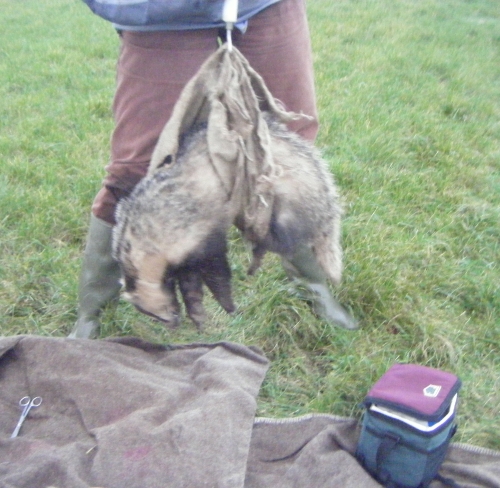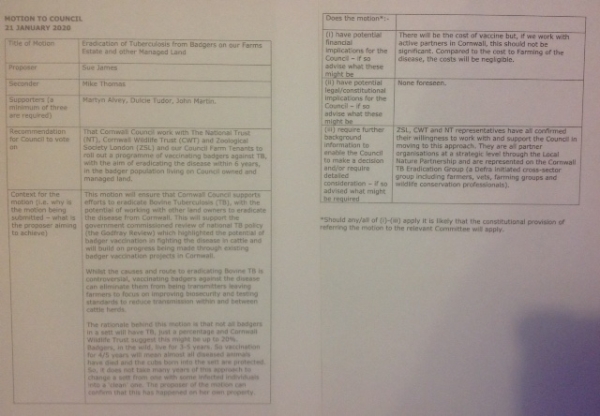Motion to Promote Vaccinating Badgers Against TB
Wildlife Trusts, National Trust, Zoological Society London and probably others are working to promote the vaccination of badgers against TB as a way of reducing, possibly eliminating the disease from badger setts so they cannot infect cattle.
Everyone agrees that Bovine TB is serious and has a devastating impact on farming but people debate over the science, the causes and solutions. This motion is aimed at Cornwall Council joining forces with partners to expand the badger vaccination programme in Cornwall to a scale that, I believe, we could demonstrate the potential to eliminate the disease from badgers. The increased scale and collaboration would likely reduce the cost of vaccination, currently estimated at £230/ 100 acres excluding any in-kind staff time and travel costs, and improve our scientific knowledge so that eradicating Bovine TB would have one less transmission route to worry about.
For those that doubt the potential to eradicate TB from Badgers, here are some facts, supplied by Cornwall Wildlife Trust:
- Where a badger sett is infected, it will not be the whole population of that sett and testing shows it to be between 15 and 20%
- In the wild, badgers live for 3 – 5 years so a vaccination programme for 4 years will mean the 80%+ of the badgers that were not infected and the young are protected against the disease and the infected ones will have died.
Zoological Society London, who have a research vaccination programme in West Cornwall, have demonstrated that vaccination does not affect a badgers roaming so, this method of reducing TB in badgers does not cause the animals to travel greater distances. This reduces their risk of moving from an infected area to a uninfected one, whereas research shows that culling does increase the distances badgers travel thus increasing this particular risk.
So, if we could show the potential to eliminate TB from the badger population in Cornwall, why would we not want to support our farmers and get on with it? If we remove badgers as a transmitter of the disease, vets, farmers and scientists could concentrate their efforts on improving the testing of cattle, reducing the spread of the disease within and between herds and producing an effective vaccine for cattle.

Badger vaccination and health check at Higher Carnyorth Farm, part of the Zoological Society London research project. The animals are now all TB free
What Zoological Society London are saying – taken from their website:
Scientists, farmers and policymakers discuss badger vaccination.
For decades, conservationists, vets and farmers have been at loggerheads about the best way to manage bovine tuberculosis (bTB). This cattle disease, which can be a huge burden on farmers and farm businesses, also infects badgers. Badgers can pass the infection back to cattle, making it difficult to eradicate the disease. In England, the government’s bTB policy encourages farmers to kill badgers in a series of coast-to-coast culling operations which already cover over half the land area of the South West Peninsula, with tens of thousands of badgers killed each year. However, a recent independent review advised the UK government to explore badger vaccination as an alternative to culling, and the Irish government is already moving from culling to vaccination. At this event, scientists, farmers and policymakers will review the evidence concerning the effectiveness, practicalities and cost of badger vaccination, to explore what role it might play in eradicating bTB from Great Britain.
Link to Zoological Society London website
What Wildlife Trust says – taken from their website:
We believe an evidence-based and scientifically reliable approach must be developed to counteract the risk posed to cattle by bTB.
Be an advocate for badgers today and join our call on the Government to abandon its failed culling policy and take immediate action to:
1. Accelerate research into cattle vaccination and improve testing regimes for cattle
Cattle vaccination offers the best long-term way to reduce bTB in the cattle population. The research, testing and trialling of a vaccine has been completed, but it is not yet technically called a vaccine in this country as it has to be accredited. However, accreditation for the European market cannot be progressed whilst an EU ban remains in place on the use of such a vaccine. The ban exists because BCG vaccination of cattle can interfere with the tuberculin skin test which is the recognised primary diagnostic test for TB in cattle. A test called a DIVA test could help resolve this issue.
2. Reduce cow-to-cow infections – the major cause of TB infection
The risk of spreading disease when cattle are transported can be minimised by tightening movement controls on cattle even further.
3. Ensure higher standards of biosecurity on farms
Studies indicate bTB transmission may occur via contaminated pasture or around farm buildings but a study by the Food and Environment Research Agency concluded that simple exclusion measures are 100% effective in preventing badgers entering farm buildings when deployed properly. Best practice videos and leaflets are available from Defra. If biosecurity is linked to cross-compliance for subsidy payments on-farm disease transmission should be significantly prevented.
4. Help to roll out badger vaccinations
Badger vaccination has the potential to reduce badger-to-cattle transmission by lowering the prevalence of infection in the badger population. Vaccination does not remove infected badgers, but it does reduce their ability to infect other badgers (which are protected by the vaccine). Over time, the infected animals should die off, and the prevalence of infection would be expected to decline.
In a clinical trial, the BCG vaccine reduced the risk of vaccinated badgers testing positive to a test of progressed infection by 76%, and reduced the risk of testing positive to any of the available live tests of infection by 54%. In the same clinical trial, BCG vaccination reduced the risk of infection of unvaccinated cubs in a vaccinated social group – when more than a third of the social group was vaccinated, the risk to unvaccinated cubs was reduced by 79%.
Link to Cornwall Wildlife Trust Website



